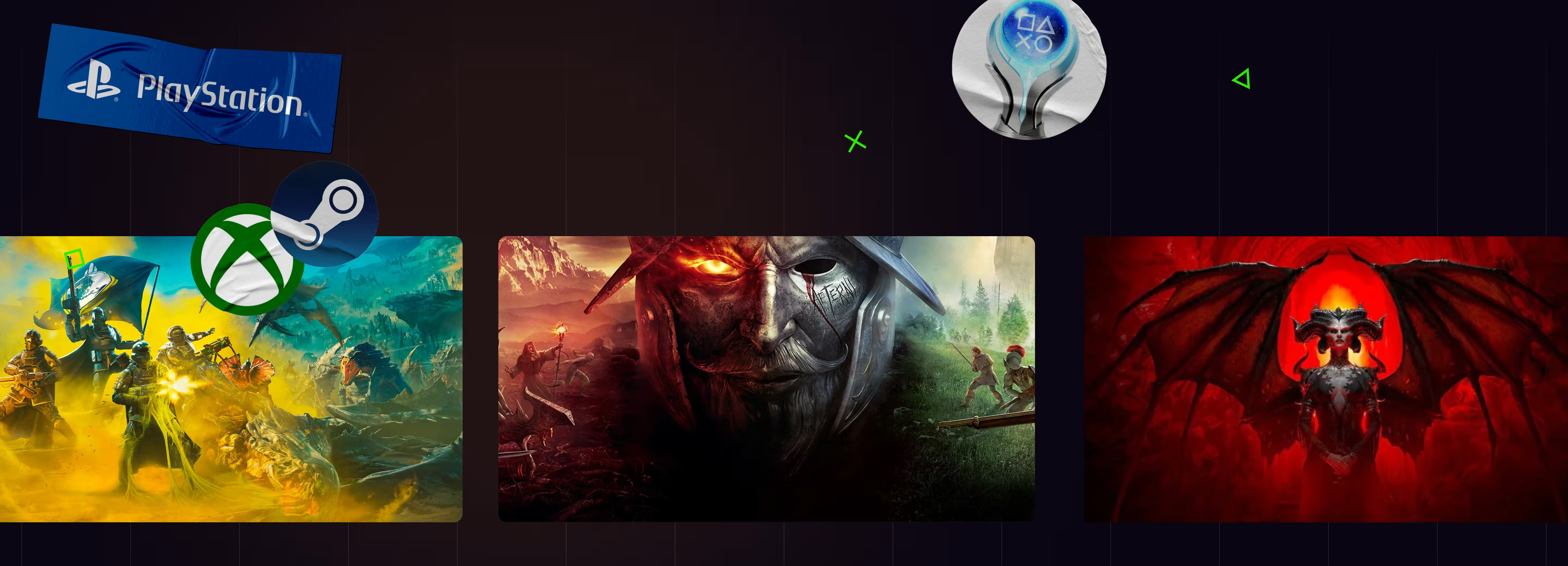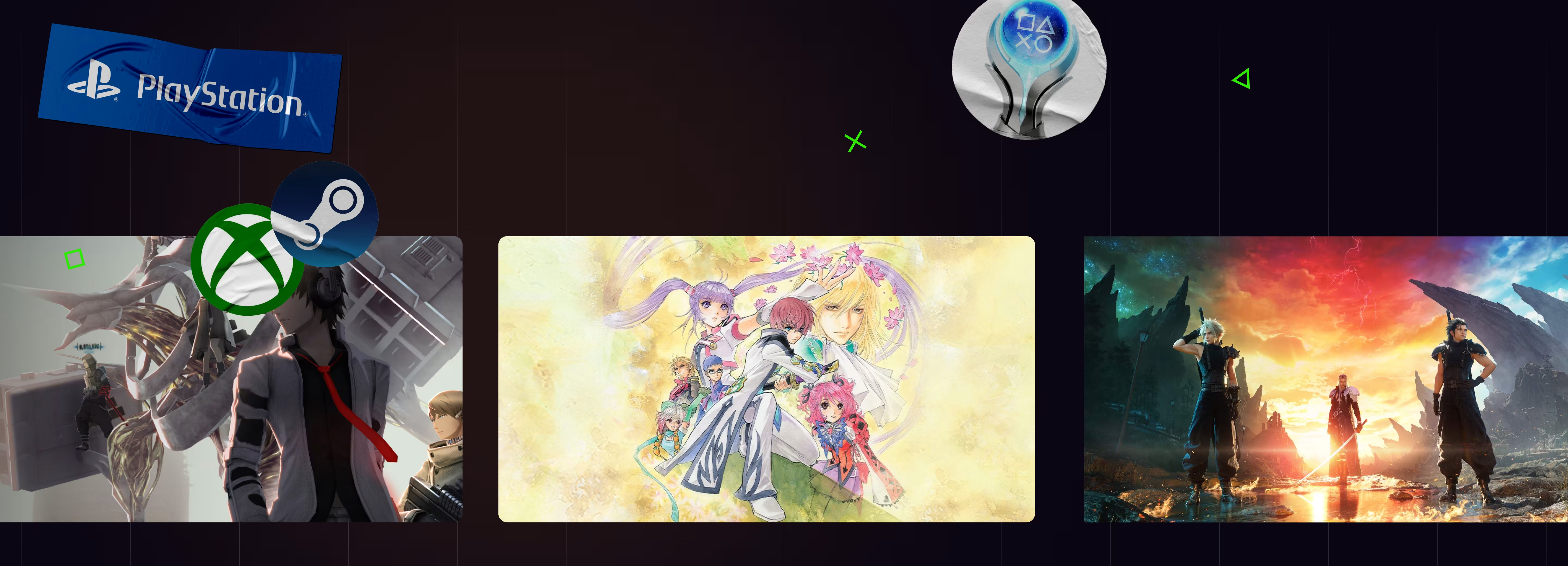Gaming Rewind 2024: What's Next in 2025

Remember when we thought AI companions would never feel real? When cross-platform play was just a dream? 2024 changed all that. From NPCs that actually remember your choices to remasters that made us fall in love with classics all over again, gaming evolved faster than anyone expected.
But here's the thing – 2024 was just the tutorial. As we look ahead to 2025, the gaming industry is gearing up for changes that will redefine what's possible in virtual worlds. Whether you're a casual mobile gamer or a hardcore PC enthusiast, the next wave of gaming innovations is about to change how we all play.
In this deep dive, we'll look at how 2024 reshaped gaming and explore the trends that will dominate 2025. From breakthrough AI technology to the return of VR, get ready for a future that's closer than you think.
AI Revolution: From NPCs to Digital Companions
Remember your first conversation with a game character that felt... real? 2024 made those moments common. AI didn't just level up – it completely transformed how we interact with virtual worlds.
How 2024 Changed the Game
Starfield broke new ground with NPCs that remembered not just your choices, but how you made them. Companions noticed your combat style, adapted to your exploration patterns, and even called you out on contradicting your previous decisions. This wasn't just scripted dialogue – it was genuine digital intelligence.
Baldur's Gate 3 took it further, introducing NPCs whose personalities evolved based on your party dynamics. Characters developed relationships not just with you, but with each other, creating stories that felt uniquely personal to each player.
Starfield broke new ground with NPCs that remembered not just your choices, but how you made them. Companions noticed your combat style, adapted to your exploration patterns, and even called you out on contradicting your previous decisions. This wasn't just scripted dialogue – it was genuine digital intelligence.
Baldur's Gate 3 took it further, introducing NPCs whose personalities evolved based on your party dynamics. Characters developed relationships not just with you, but with each other, creating stories that felt uniquely personal to each player.
Beyond Scripted Responses
What made 2024's AI special wasn't just smarter NPCs. Games started using AI to:
Generate unique side quests based on your playstyle
Adapt enemy tactics to counter your favorite strategies
Create dynamic conversations that never felt repetitive
Adjust difficulty in real-time without obvious scaling
The Reality Check
But it wasn't all perfect. Some games struggled with AI that was too smart, leading to:
Unpredictable storyline developments that confused players
Combat scenarios that became frustratingly difficult
Conversations that occasionally went off the rails
Resource-heavy systems that challenged even powerful gaming rigs
This revolution in AI gaming showed us both the incredible potential and the challenges ahead. As developers learn from these experiences, they're already working on solutions that will shape gaming's future.

Cross-Platform Gaming: Breaking Down the Walls
In 2024, the dream of playing with anyone, anywhere, finally became reality. Cross-platform play transformed from a marketing buzzword into a genuine game-changer.
The Cross-Platform Breakthrough
Diablo 4 set the gold standard by uniting PC, PlayStation, and Xbox communities seamlessly. No more checking which platform your friends were on – you just jumped in and played. Call of Duty: Modern Warfare III followed suit, making platform choice irrelevant to the gaming experience.
New World finally bridged the gap between PC and console players, bringing its massive multiplayer world to PlayStation 5 and Xbox Series X|S. The shared servers created a truly unified community, with cross-platform guilds and alliances reshaping the game's social dynamics.
Helldivers II's PlayStation 5 and PC cross-play became a surprise hit, showing how cooperative gameplay could unite different platform communities. Players fought for Super Earth together, regardless of their chosen platform, proving that the war for freedom knows no platform boundaries.
Beyond Just Playing Together
Cross-platform in 2024 meant more than just shared multiplayer:
Cross-progression kept your achievements and items synced across devices
Shared marketplaces unified in-game economies
Cross-save features let you continue your journey anywhere
Universal friend lists made connecting with players effortless
Community Impact
This shift fundamentally changed how gaming communities operated. Discord servers buzzed with mixed-platform players, tournament scenes expanded beyond platform limitations, and friend groups no longer split based on console choice. Even smaller games found new life with larger, more sustainable player bases across platforms.
The Growing Pains
The transition wasn't perfect. Balance issues between mouse/keyboard and controller players remained a challenge, while performance differences across platforms sometimes created friction. Varying update schedules and platform-specific features occasionally limited cross-play potential, reminding us that true unity still had hurdles to overcome.
2024 proved that cross-platform gaming isn't just possible – it's becoming the industry standard. Games that launched without these features felt noticeably behind the times.

Nostalgia Done Right: Classic Games, Modern Standards
2024 proved that bringing back beloved games isn't just about updating graphics. It's about preserving what made them special while making them accessible to modern audiences.
The Return of Classics
Tales of Graces f Remastered showed how to honor a classic JRPG while modernizing its systems. The enhanced combat fluidity and revised user interface made a decade-old game feel fresh, without losing the charm that made fans fall in love originally.
Freedom Wars made its triumphant return with a remaster that brought the post-apocalyptic action to modern platforms. The enhanced visuals and refined multiplayer breathed new life into this PlayStation Vita classic, finally giving it the audience it deserved.
Final Fantasy VII Rebirth took nostalgia in a bold new direction, reimagining the original's iconic moments while daring to tell its own story. This wasn't just a remake – it was a reinvention that respected both old and new players.
Modern Touches That Mattered
These remasters succeeded by understanding that modernization goes beyond graphics. Quality-of-life improvements, smoother performance, and thoughtful additions showed respect for both the games' history and current player expectations.
A New Standard for Revivals
The impact went beyond just updated visuals. Modern save systems, refined controls, and enhanced accessibility options made these classics more approachable than ever. Developers found the sweet spot between preservation and innovation, proving that nostalgia and modern gaming standards aren't mutually exclusive.
Learning From the Past
Not every revival hit the mark. Some remasters struggled to justify their existence beyond graphical updates, while others added unnecessary features that disrupted the original experience. The successful ones taught us that the best remasters enhance what made the original special rather than trying to reinvent it completely.

What's Defining Gaming in 2025: The Next Evolution
After a groundbreaking 2024, the gaming industry isn't slowing down. The upcoming year promises to revolutionize not just how we play, but how games understand and adapt to us.
AI Gets Personal
Forget everything you know about game AI. 2025's artificial intelligence isn't just about smarter NPCs – it's about creating truly responsive worlds. Games will understand your playstyle, adjusting their storylines and challenges in real-time. NPCs will remember your actions across different games in a series, creating a persistent gaming history that follows you. Even when you're offline, these worlds will continue evolving based on community actions, making every return to the game a new experience.
Cloud Gaming Finally Delivers
The promise of play-anywhere gaming becomes reality in 2025. Microsoft's Xbox Cloud Gaming and PlayStation Cloud are leading a revolution where AAA games run flawlessly on mobile devices. Zero-latency technology makes cloud gaming feel native, while cross-save features work seamlessly across all devices. New games are being designed specifically for cloud capabilities, taking advantage of processing power that was previously unimaginable on portable devices.
Bold New Worlds
While sequels dominated 2024, 2025 marks the return of original ideas and ambitious reinventions. Kingdom Come: Deliverance II isn't just improving graphics – it's introducing a living medieval world where every NPC has a purpose. Monster Hunter Wilds brings dynamic ecosystems where creatures interact naturally, not just with players. New IPs from major studios are daring to explore genres we haven't seen in years.
VR's Second Coming
Virtual Reality is staging a comeback with technology that finally matches our ambitions. Half-Life: Alyx 2 is showcasing physics interactions that feel truly natural, while new VR systems have significantly reduced motion sickness. Social VR spaces are becoming legitimate alternatives to traditional online interaction, and mixed reality features are blending virtual and real environments in ways we've only dreamed of.
Gaming Gets Greener
The industry is taking serious steps toward sustainability. Major studios are pledging to achieve carbon neutrality, while games are teaching environmental awareness through gameplay, not just stories. Energy-efficient development tools and server infrastructure are becoming standard, and digital-first distribution is reducing the industry's physical footprint.
This isn't just another year of incremental improvements. 2025 is set to redefine gaming at its core, challenging our expectations of what games can be. The real question isn't whether we're ready for these changes – it's how quickly we'll adapt to them.
The Future is Now: Gaming's Next Chapter
As we look back at 2024's achievements and forward to 2025's promises, one thing becomes crystal clear: gaming isn't just evolving – it's transforming. From AI that understands us to cross-platform play that unites us, the barriers between different gaming experiences are breaking down.
The success stories of 2024 – whether it's Helldivers II's seamless cross-play, Baldur's Gate 3's revolutionary AI, or Tales of Graces f's masterful remaster – have set new standards for what players expect. These aren't just features anymore; they're the foundation for gaming's future.
Looking ahead to 2025, we're not just getting better graphics or bigger worlds. We're entering an era where games truly understand and adapt to each player, where hardware limitations become irrelevant through cloud gaming, and where bold new ideas push the boundaries of what's possible. The upcoming releases like Monster Hunter Wilds and Kingdom Come: Deliverance II aren't just sequels – they're glimpses into gaming's next evolution.
Share Article